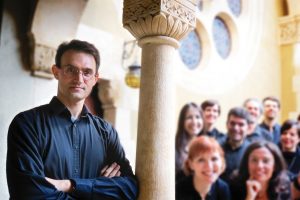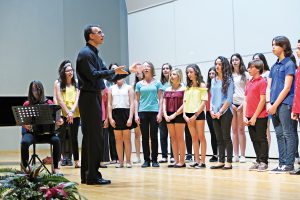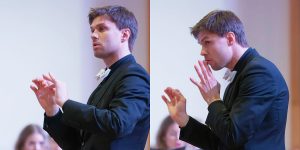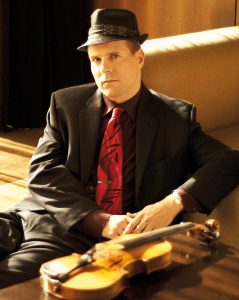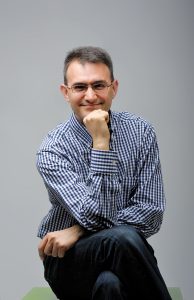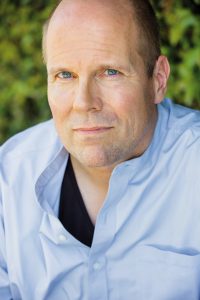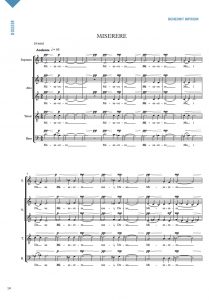IFCM Composition Competition 2017, Interview with the Winners, Biographies of the Winners
The IFCM Choral Composition Competition has come to an end. This is the third edition organised by the International Federation for Choral Music with the aim to promote the creation and wide distribution of a new and innovative choral repertoire. IFCM holds the composers and their intellectual work in high regard. The jury, made up of Ko Matsushita (Japan, President), Oscar Escalada (Argentina, member), Dominick DiOrio (USA, member), Josep Vila (Spain, member) and Ambrož Čopi (Slovenia, member) rated 181 works submitted by composers from 5 continents. The winner of the first prize was the piece entitled ‘NUR’ by the Spaniard Juan Manuel Conejo Gonzales. Second place went to the Polish composer Jakub Szafrański with the work ‘Falling Stars’ and the third place went to Benedikt Brydern (USA) for the piece ‘Miserere’. The three winners will receive a cash prize, a diploma and a trophy. Further information on www.ifcm.net
Interview with the three winners
By Karolina Silkina, choral conductor and journalist
Karoline Silkina: When did you first get interested in music? How old were you?
Juan Manuel Conejo Gonzalez: My parents always played records at home when I was a child. I really liked listening to them, all kinds of music, but above all, classical music. I think I was five years old. But I remember that one day – at the age of seven, more or less – tuning my radio, I found something so exciting for me, something that moved and touched me just listening to it: choral music. I do not remember exactly what style it was, sacred Renaissance music, perhaps. Since then, it has been a passion for me. My father told me about a music teacher at school in my little village – Fuensalida (Toledo) – and I started to study piano with him, at twelve years old. Soon I began my musical studies at the Jacinto Guerrero Conservatory of Toledo and later I finished them at the Royal Conservatory of Music of Madrid where I studied my degree in Pedagogy and Composition.
Jakub Szafrański: Music was present in my life from the very beginning. My dad loves Beethoven and plenty of my family members played various instruments. My parents decided for me to go to primary music school and this is how my journey started.
Benedikt Brydern: In Germany pretty much every kid started on an instrument when I grew up. My mother wasn’t too fond of the piano, so she had me started on violin at the age of six.
How did you begin composing for choir?
JMCG: I started singing in a choir – San José Choir – in my village when I was thirteen. A few years later I began to feel the need, firstly to arrange some popular hits, and secondly to compose some small carols. I was lucky to perform those works since the director liked them. In 1991 I began to study choral conducting in several workshops in Lleida and Tarragona and soon I became the conductor of San José choir. Then I composed a few more interesting works, sacred and profane. In 1997 I participated with San José Choir in the VII Griñón Choral Contest in Madrid. Each choir must sing a folk song and I composed a work based on Miguel de Cervantes words: Ausencias de Dulcinea. Happily it won an award, and of course, this was a great boost for my career as a choral composer.
JS: I started singing in the choir when I was a teenager. This kind of music shaped my sensitivity. Before I started composing I was arranging multiple pieces, mainly for a vocal band which I started and which consisted of my close friends. The goal was to have some good time together, we did not even plan for concerts. Yet the band started giving concerts and I decided to compose my first pieces. This was also an experience that led me to studying conducting. Now I am also second conductor of the Warsaw School of Economics and of the Male Choir of St. John’s Archcathedral ‘Cantores Minores’ also in Warsaw.
BB: Being a professional violinist I often performed the amazing pieces incorporating a choir, like Mozart’s “Requiem”, Handel’s “Messiah” or Lauridsen’s “Lux Aeterna” and was impressed by the power of the voices. But it took many years before I started my first choral composition.
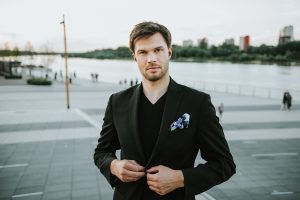
What would you say are the most important influences on your music?
JMCG: There are several influences. Firstly, all music of the Middle Ages and the Renaissance . I like so much the early examples ofwriting music and using musical textures: plainchant, organum, descant, heterophony, counterpoint… I can find there all the basic elements I need to compose and create new music; by studying and analysing them, I take good advantage of them in order to obtain the best results. I like practically all Renaissance composers but I am very impressed by the music of Tomás Luis de Victoria. It is amazing how, by using polyphony, he is able to achieve such an expressive music. In my opinion he is one of the best Spanish composers of all time. Fortunately, there are currently Spanish choirs and institutions that are working hard to enhance his fame. Secondly, I have always admired the music of Zoltan Kodaly and Benjamin Britten because of the harmonies they use and their way of working with the text and treating the voice. You can find in their music clarity, cleanliness, simplicity, expressiveness… They are, for sure, reference composers for me in my way of conceiving a composition. Finally, I must mention Einojuhani Rautavaara, György Ligeti and Salvatore Sciarrino in their way of making, constructing, and researching new harmonies, structures, or musical textures and sounds.
JS: An important factor in composing music for me are the people around me. Their behaviour, opinions and sensitivity influence me a lot. Other factors are spirituality and philosophy, that is why I find sacred music very inspirational. Also other arts like literature or fine arts are a source of inspiration.
BB: Melody, harmony and form.
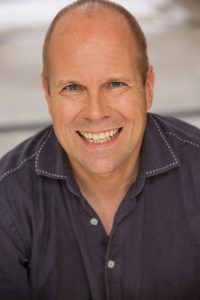
Do you consider the audience when you’re working on a composition?
JMCG: Of course. When I studied Composition at the Royal Conservatory of Music of Madrid, I was lucky to receive advice from a great Spanish lecturer and composer whom I greatly admire too: Antón García Abril. He always said in his lessons that “…you can look for your own style, but do not forget the audience..! Try to look for good – but not easy – melodies…!” I will never forget these words. And it is very difficult to do this! I have composed for different choirs, from amateur to high level performance, and I have always tried to work taking into account the vocal characteristics on each level. I understand what an amateur choir needs, and logically I will write depending on its needs. But for a medium level or professional choir I will try to do the best for each one. I like so much the melody, but – at the same time – I try to work in new harmonies, new structures and textural elements in order to create interest for the audience.
JS: In my opinion music should not be composed for a specific audience. My music is, though, focused on the audience in the way that I share my musical thoughts with them. When it turns out that my musical perspective is understood by the audience I am very happy. However I do not write music to fulfil the needs of the audience. An exception can be pieces dedicated for particular people – then I do my best to compose pieces which the recipient will like, thus I adjust to their music taste.
BB: Unless I write for the commercial media/market I think about it, but in general artistic expression without boundaries comes first.
How important is it that music should be accessible on first hearing?
JMCG: I think not only on first hearing but also on first performance…! It is really a good question because when you do a premiere, often your music is only performed just once. To avoid this, it is better that your music is accessible to the audience, but also to choirs, musicians or singers, and of course, to promoters.
JS: Accessibility of music for the audience depends on their musical experience and knowledge. Often pieces are not entirely understood and their meaning can be discovered only after listening to them multiple times. When I listen to music I am very attentive – I try to hear all of the details and understand all of the thoughts of the composer. In my opinion a good composition should encourage curiosity – it should not be discouraging, but at the same time not too obvious. It should bring some mystery with it. I feel like a detective when I discover more and more hints left by composer.
BB: Not really important. Great music will always get you excited and trigger an emotional reaction, even if you don’t “understand” everything yet. It also depends on the music you have heard in your life, the different styles you got exposed to, etc.
What are you working on at the moment? Do you have anything else coming up?
JMCG: Yes. Now I am writing a piece for piano for four hands. It is a commission for the COMA’18, that is, the Contemporary Music Festival of Madrid, organized by AMCC (Madrilenian Composers Association) to which I belong. It is a work based on Castilian folk elements and it will be premiered at the end of this year. Although I specialize in choral composition, I am still writing chamber music or solo works. I would like to write music for orchestra, but it is very difficult for me so far. I am also making popular music arrangements for children’s choirs that I am conducting at the Conservatory, creating new repertoire for them. As for new choral projects, I am thinking about composing all the Lamentations of Jeremiah for Maundy Thursday, Good Friday and Holy Saturday, recreating some elements of Victoria’s Lamentations.
JS: Lately I have written two pieces– Gloria di Angelis and Hail, oh Mother – both for contests. I also had the pleasure of arranging patriotic pieces for the Philharmony in Poznań, specifically for the Poznań Chamber Choir, conducted by Bartosz Michałowski. Currently I am still working on an hour-long oratory Vesperae in Ascensione Domini for symphonic orchestra, 2 mixed choirs and Gregorian schola.
BB: I am finishing a double concerto for two violins and orchestra and way down the line I am working on a “Requiem” or something similar in scale.
Artists almost always have their methods for working in their craft. How would you describe your general process for creating a new score?
JMCG: If I have to write choral music, first of all I read the text several times and I start thinking about the general idea of the music, taking some notes. This part of the process can take minutes, hours, days or even longer, depending on the type of the score. It may seem like fun because I can be in this phase while walking in the park with my wife and children, cooking, driving to work, even taking a shower…! Many times I get ideas about structure and some melodies appear in my mind… I even think how I would like to finish my score. That is very important to me.
After this, I sit down at the piano and start to get carried away by the text as I write the music. When I have written a good part of the work, I use my computer to edit the music. From that moment, I continue writing at the computer, always checking the harmony on the piano and copying the rest of the notes. In general, I tend to be quite meticulous in my writing: thinking about a chord for a long time, listening to the music, changing notes or voices, structure…
JS: Before I start I usually write down all of the inspirations and ideas that come to my mind, without using any notes. Sometimes they are single words, sometimes formal ideas. After this process I am ready to decide on the form of the piece. The more I work during this phase, the more effectively I work on the score and on changing the idea into music. There are also fixedsound ideas which occur to me during writing the score and which I use. After creating the first draft I move on to add details. To me this process can be compared to creating a sculpture out of stone or a piece of wood, carving more and more details to create the final effect.
BB: If it is a commission, I just sit down and get started on writing for that particular instrumentation. Maybe a harmonic progression gets me inspired or a melody. Often I start with the middle or ending of a piece. You never know when inspiration strikes. Often I discard many ideas but use one that appeared halfway through a sketch.
Could you discuss the role that text plays in your compositional process?
JMCG: When I have to compose choral music, the text is my guide and almost my main source of inspiration. I always compose adjusting the music to the text. You could say that I am a madrigalist in the XXI century…! All the elements I use in my scores come from the text: melodies, rhythms, all types of creative processes, and surely the structure.
JS: I find the meaning of the words very important. Sometimes I try to express them directly by sounds, sometimes the music is just metaphor for the text which contains some valuable ideas.
BB: When writing for voice(s) the text is very important. It triggers rhythm, melody and dynamics.
What piece of music (any medium) do you wish you had composed?
JMCG: It’s a very interesting question, but at the same time, difficult to answer.
There is a lot of music that I would have liked to compose, especially from the Renaissance. But in my opinion each piece of music belongs to its time and historical circumstances which produce a very particular vision of art. Anyway, I wish I had composed any of Tomás Luis de Victoria works. I find it incredible how with so few elements he is able to generate so much expressiveness in his music. He was such a brilliant composer.
JS: I have always wanted to write a choral opera. It would be scenic performance for more than one choir with movement, an interesting plot and all the elements which you can find in a classic opera, but performed purely by choir members.
BB: Something like Handel’s “Messiah” which still gets played and is loved around the world after centuries have gone by!
What would you say defines your style?
JMCG: Eclecticism, undoubtedly, although I tend to be somewhat modal…. I always try not to repeat the same processes or the same chords or scales. I want to say something different in each score, but it also depends on the type of the work. If it is choral or vocal I always have the text as a valuable guide. If instrumental, I use a slightly different way of thinking: serialism, folk elements, aleatoric music…
JS: In my music I pursue beauty. In choral pieces I attempt to use the vast array of capabilities of the human voice without harming it. I also like to give the singers the possibility to influence the performance by including aleatoric parts in my pieces. Thanks to this each performance is very unique.
BB: Fairly traditional contemporary classical (not too avant-garde), incorporating also elements from jazz, pop and other styles.
Tell me about your hobbies and interests.
JMCG: I like swimming, reading, going to the theatre and cinema… but especially I like going for a stroll with my family and playing with my children. Although it couldn’t be considered as a hobby, I enjoy conducting a lot and putting on concerts with the camera choir ‘In Hora Sexta’. This is one of the projects that I like the most, since we have been singing together for more than fifteen years. They are my friends and I love them.
JS: I love soccer, I try to play myself every week, my favourite team is Liverpool. When I have a chance I also enjoy mountain hiking.
BB: I like photography and also assembling computers or designing websites.
Tell me something about your awarded piece at the IFCM contest.
JMCG: I was thinking about NUR for a long time. There is a choir in Madrid whose name is Nur, which has performed and premiered several of my works. I wanted to thank them by composing a work with its name. So I was investigating about Nur, its meaning, and I thought about how we perceive light, and what it could represent to us. At the same time, I was thinking about its physical properties: reflection and refraction, and then I wrote the text. I picked out six languages whose words for “light” are monosyllables, including the Latin language. A friend of mine who is an expert in English language, Susana Martín, helped me in adapting the original text into more correct English. The first day I composed a few chords playing the piano, and suddenly I had more than the beginning of the score. The rest of the work consisted in a development in which light’s physical properties are musically treated and where different languages are used to create harmonic colour. The most relevant aspect of NUR is the connection between music and text.
JS: Falling stars was written to a poem of Rainer Maria Rilke. The poem is about falling stars in the context of the wishes we make, when we see them fall. In this piece I wanted to express the stars’ movement and their majesty, and also – following the poem – their ‘daring play’. Falling stars consists of contrasting textures and utilizes contemporary executive techniques (glissando, aleatoricism).
BB: “Miserere” is my first composition for SATB a cappella. I have written for vocal soloists before, but this time I thought I wanted to explore the colours and possibilities of voices only. The piece starts quietly with “soft” dissonant chords and soon picks up with a driving rhythm in odd-meter time (7/8). After a climax we return to the first harmonic idea and come to a peaceful close.
What does this IFCM prize mean for you?
JMCG: Oh, It has been amazing! It is a great honour for me to have won the IFCM first prize. For some time I have been attempting to show my music internationally and this type of award is the best platform to achieve that. It will be a ‘before’ and an ‘after’ in my choral production, and of course in my life as a composer and I hope it can help me to boost my compositional career. In recent years I have not been able to compose much because besides my job as a teacher at the conservatory, I have three very young children… you can imagine… but now I seem to find more time to write music. I am a very lucky man. I know how difficult it is to get this prize because it is a highly competitive contest and there are very high level composers from all over the world. I want to thank the IFCM and its jury for having thought that my music is worthy of this award, and of course, I want to congratulate again Jakub Szafrański and Benedikt Brydern for their prizes. Thank you very much.
JS: I am very happy and honoured to be awarded a prize in the IFCM contest. It is the biggest contest I have ever taken part in. The IFCM is a very renowned organisation internationally. I also see this award as an important step in my career.
BB: I am really honoured to be in the group of the award winners. I have been on a few juries myself and it is never easy to select a few out of a hundred submissions. And there are so many talented composers out there. Also, this will be my first exposure to the world of choirs, choral directors and singers, etc. which I am really excited about!
Interview edited by Caroline Maxwell, UK
IFCM Composition Competition Winners’ biographies
JUAN MANUEL CONEJO GONZÁLEZ
He studied Composition at the Royal Conservatory of Music of Madrid with Antón García Abril, Manuel Seco de Arpe, Alicia Diaz de la Fuente and Alfonso Romero, specializing in Composition for Audio-visual Media. He has also conducted choirs in Lleida, Tarragona, Daroca and Bilbao with Josep R-Gil-Tàrrega, Enrique Azurza, Nestor Andrenacci, Lluís and Josep Vila, Johan Duicjk, Martin Schmidt, Vasco Negreiros and Werner Pfaff, among others. He is currently a composer, Solfege and Piano teacher, and choral conductor at the professional Conservatory of Music of Getafe (Madrid) and conductor of the Camera Group “In Hora Sexta” in Madrid. His has extensive training, having attended courses and seminars in Choral Conducting and Composition: he has been given advice from José María Sánchez Verdú, Cesar Camarero, Jesús Legido, José Manuel López, and Salvador Brotons, among others. He is a member of the Madrilian Composers Association “AMCC”. Although his production covers the composition of symphonic works, chamber, and solo instruments, he is specialized in choral music.
As a composer of choral music he has publications in Real Musical and Piles and has gained several awards:
- 1st prize in the VII edition of the awards in Canary Islands Choral Composition Competition: “No Vale” (2001).
- In 2002, 2006 and 2011, 1st prize in the contest “Paco Llácer” of Valencia, with works “Cançó de the nit de Sant Joan”, “Canciones de Jinete” and “Mariposa del aire”. Published by Piles.
- 1st prize at the X Competition for Choral Composition “City of La Laguna”, in Santa Cruz de Tenerife: “Darianas” (2004).
- 1st prize ex aequo of the Choral Composition Competition “Magerit”, in Madrid: “Pharmasuite: Aspilina” (2007).
His works have been performed by the Magerit Choir, Carlos III University Choir, Vocal Group 21st Century, NUR Choir, Vocal Group In Hora Sexta, FECOCOVA Valencia Choir, Tenerife Reyes Bartlet Choir, and others.
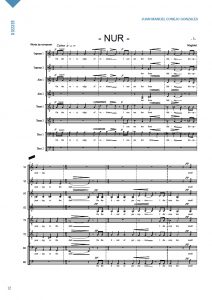
JAKUB SZAFRAŃSKI
Conductor, composer and arranger. A graduate of Grażyna Bacewicz primary and secondary music school in Warsaw. As an alumni of the Fryderyk Chopin Music University, Jakub completed his bachelor’s degree in Trumpet and in Music Ensembles Conducting. He also holds a master’s degree in Choral Conducting in the class of prof. Ryszard Zimak and in Composition in the class of prof. Paweł Łukaszewski – diplomas completed with distinction. In 2015, Jakub started working with Warsaw School of Economics Choir as a second conductor. In the same year he founded the Artistic and Science Club of Choral Conducting at the Fryderyk Chopin University of Music. In 2016 he started his cooperation with Archcathedral Male Choir Cantores Minores in Warsaw as a composer and a second conductor. In 2017, he started working at Fryderyk Chopin Music University as a lecturer. Under his leadership, the Warsaw School of Economics Female Choir has won prizes at international choral contests. Jakub Szafrański is a finalist of many composing competitions and his pieces are performed by numerous Polish and foreign choirs. His musical style is characterized by contemporary textural designs using archaisms and styling. Another feature of his compositional workshop is the extraction of timbre resulting from the rare combinations of the executive apparatus.
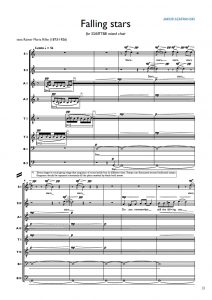
BENEDIKT BRYDERN
Benedikt Brydern studied violin and piano at the Richard-Strauss Academy of Music in Munich, Germany. He undertook private composition studies with Romanian composer Stefan Zorzor. He was selected out of 1000 applicants for Schleswig-Holstein Music Festival to perform in the Festival Orchestra under the baton of Leonard Bernstein in 1988. He returned to the Festival in 1990 to be part in the TV series “Orchestra!” hosted by Sir Georg Solti and Dudley Moore. After graduating in 1992 he received a Rotary International Ambassadorial Scholarship to continue his studies in the United States where he completed the Advanced Studies Program “Scoring for Motion Pictures and Television” at the prestigious USC Thornton School of Music in Los Angeles. His teachers included David Raksin, Elmer Bernstein and Bruce Broughton. He won two Marmor Composition Awards sponsored by the Stanford University Music Department, and the 2002 William Lincer Foundation Chamber Music Competition. In 2004, the Composer’s Symposium at the Bach Festival in Eugene, Ore., commissioned BB to compose a string trio in honour of George Crumb’s 75th birthday. The Oakland East Bay Symphony in conjunction with the James Irvine Foundation commissioned a new piece for their 2010/11 season. His compositions have been performed by the Atlanta Symphony Orchestra, the Sacramento Philharmonic, the Oakland East Bay Symphony and many chamber music ensembles worldwide.
His music has been published by Ries & Erler, Mel Bay, Edition Kossack and Peer Music International.
Biographies edited by Louise Wiseman, UK
Karoline Silkina was born in Grodno, Belarus. There, she started her fascinating musical adventure playing the piano, singing in the choir, taking part in numerous concerts and winning competitions. She is currently studying Public Relations at the University of Warsaw and has an interest in PR, marketing, visual marketing, social media and communication. In addition, Karoline is a second-year student of choral conducting at the F. Chopin University of Music. Karoline is the founder and conductor of the Journalism Department choir at the University of Warsaw. Email: caroline.silkina@gmail.com
